| Strategy | Luck |
|---|---|
| Interaction | Components & Design |
| Complexity | Score |
7:30 - Breakfast with wife 2.
8:00 - Meet with mercenary commander al-Temsaah about Silk Road crisis situation.
10:00 - Follow-up meeting with Guild of Lore re: my title as Diplomat.
Price seems steep.
11:00 - Explain his assignment in North Africa to cousin Azif. Again.
12:00 - Lunch with wife 1.
...
-- from the appointment schedule of Yusuf bin Nasir al-Ta'lab, merchant lord
It’s not easy, being a merchant lord in the empire of Caliph Harun al-Rashid. And I’m not talking about keeping your wives happy. Of course, there are some upsides to the deal as well, like being fabulously wealthy and living in one of the most advanced areas at the time, scientifically and culturally. But it’s also a camel-load of work, especially the part of staying fabulously wealthy. To properly emulate that, al-Rashid the game makes you work for your victory as well. Despite relatively simple rules – not very simple, but not outrageously complex, either – you have to make a proper effort to do well. Being a vicious bastard who doesn’t think twice about getting his opponents into trouble doesn’t hurt, either.
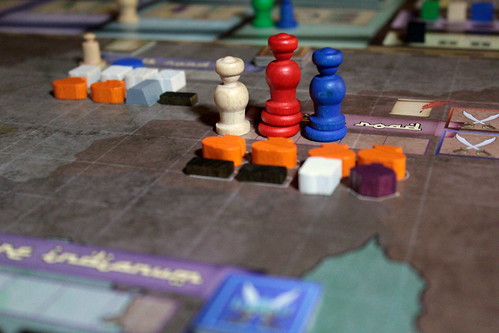
al-Rashid is a game that can easily fool you. At first, it looks like a worker placement game. All players, as heads of a rich and influential family, have their family members to send out and do errands: either trade in different parts of the world or go to one of the guild palaces right here in the city. But really, you’re not placing them as workers, you’re using them as currency in simultaneous auctions for all the locations. Your family members come in three ranks with a different Dominance score (nothing to do with whips and leather, get your mind out of the gutter). Sages have a Dominance of 1, Merchants 3 and, at the top of the chain, Pashas have 5. In phase one of the game, you place one family member each turn on any of the available locations. Merchants and Pashas, being dominant personalities, don’t get along too well, so you can only have one of either in one place. Sages, on the other hand, are very supportive: they can be stacked under any other figure and add their dominance score. (Don’t take the wording from the manual too literally. It says “pawns that are allowed to coexist in the same game area are designed to be stackable”. With enough dedication and patience, everything is stackable, and someone will spend 5 minutes balancing a Merchant on top of a Pasha …).
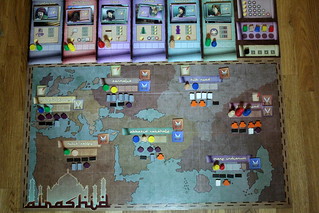
That’s the easy part of the game. In phase two of each of the five rounds, the thirteen locations are resolved one by one. This is where you can really get your opponents into trouble, because there is no fixed order of resolution. Instead, when it’s your turn, you choose one location to be resolved, and it doesn’t even have to be one with your pawns in it. Picking a location before your opponents the resources to actually use it is a great way to make enemies. On the other hand, using your turn to mess with someone else instead of doing things that benefit you leaves you open to the victims’ revenge. It may not sound like much, but activating an opponent’s location before he can use it is one of the meanest types of negative interaction I’ve recently seen in a European style game. Doing it once, at the right time, can cost someone the game. You’re not entirely defenseless, keeping enough resources at hand and making sure you stay early in the turn order helps, but still.
The reason for that nasty effect lies in the two different types of locations on the board: Map Areas, where you earn resources, and City Areas, where you spend them. Map Areas are usually quick to resolve. Each of them has a set stock of wares that is refilled every round. The most dominant player in an area gets first pick of either three wares of any kind or all wares of one kind. The next player may take two wares of his choice and the third still takes one. Players number four and five get nothing. Which wares to take can be a tough decision because of the way money works in al-Rashid. There are no actual coins in the game, you pay by discarding wares: a single unit of any type is worth one Money, two different types are already worth three and a set of all five (Wood, Metal, Pottery, Spice and Silk) is worth 15. Also, all Map Areas have different resources available in different quantities and often picking a bad combination for this turn will set you up better for the next, for example by giving you a nice reserve of the rare Spice or Silk so you don’t have to hunt them again. The one complication in collecting wares – which are, by the way, meeple wares, for which I have no good word because both weeple and warple sound ridiculous – are the crisis tiles. Some of those enter the game every round and have to be defeated by your mercenaries before any wares can be traded. However, once they are defeated, however, they are removed. Being second in dominance is more popular than you’d think because of that: let number one deal with it, take your two wares without doing any work.
Enough about earning money, though, time to spend it. That’s what you do in the City Areas: 5 Guild Palaces and the Caliph’s Palace. Each Guild Palace offers three possible actions: buying a Title, purchasing a Service or asking for a Favor. The first two cost money while the third one is free – but taking only a favor when you’re visiting a guild is considered a pretty big faux pas and makes you take a dishonor token with -2 victory points attached. Each guild has different titles for sale, some available twice when playing with four or five players. Titles do all sort of things, but they’re all pretty powerful when used right. They may give you a one-time bonus – i.e. taking two wares or upgrading a Sage into a Merchant -, an ongoing bonus – take one extra ware every time your mercenaries win a battle – or an extra action that can be activated once per round. Getting the right titles and using them right is pretty much the key to victory in al-Rashid: those things are expensive, so you don’t want to waste money on one you’re not using, but using them right gives you a big edge. Some titles, the ones from the Politics Guild, even give you a big boost in victory points at the end of the game when you meet the conditions, like having a specific set of titles or having all possible Pashas for your family. Using those right is even more difficult than the other titles, though: buy them too early and your opponents can and will block you from scoring, buy them too late and they may be gone. I’d strongly recommend that everyone look at the titles before the game starts, even before the first game. Not knowing the Titles, you can’t come up with a remotely decent strategy. Almost as important, though, it saves a lot of time that people would otherwise clean their glasses, squint at the Title cards, clean their glasses again, enquire about the availability of a magnifying glass and finally give up and buy a random title. Because the text on those cards is tiny. It’s tinier than tiny, it’s text like it was engraved by pixies on the pin of a needle. That’s all the more infuriating because the components are actually very nice. They look good, they are sturdy, there’s a lot of wood to move around the board – and then there’s the Titles which also look good, but are almost completely unreadable. They could easily have been twice the size, then everything would be fine. But nooooo.
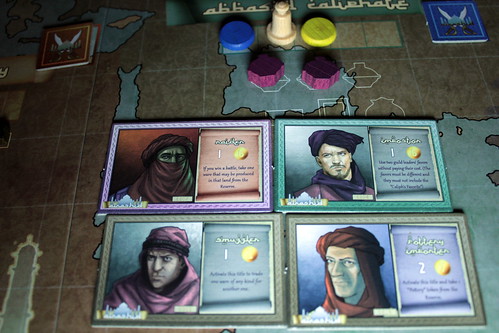
That leaves the Services and Favours for each guild, which are more quickly explained and much easier to read: as a Favour, you can exchange wares for mercenaries, buy Credit Notes – which save you money when buying titles, trade wares or flat out buy victory points. From the available services, one is to hire mercenaries, one to spy on crisis tiles and move your pawns around after they were placed and three let you grow your family (by a Sage, Merchant or Pasha, respectively). Here dominance is an important factor again because buying more pawns is expensive for the first player to do it, but gets even worse for the others. And you really, really want these additional pawns. If you don’t start buying them early, and of all types, then by the fifth and last round you’ll be hopelessly outclassed by your opponents that did. Being able to take more actions is a Good Thing™, the only downside being the price to buy the pawns. But unlike other games, you don’t end up with useless pawns because you bought too many. There’s always a space where you can place another pawn and get at least one ware from it. And at the end they’re worth points, too. There’s no downside to having them. Getting a bigger family is a necessity, there is no winning strategy with few of them.
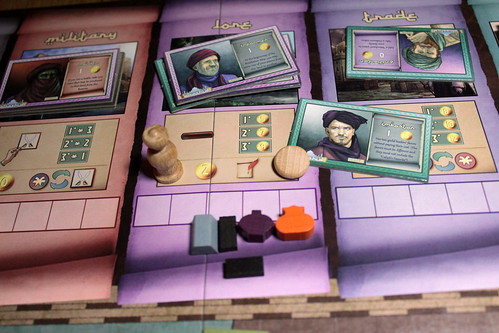
The Caliph’s Palace as the last city area is not much different from the guild palaces: you still buy titles and can ask the Caliph for a pretty big favour: put you forward in the player order. Given the many ways you can be messed with by players going before you, that’s a big deal. But Harun al-Rashid does not simply talk to anyone: if your delegation to his palace is not headed by a Pasha, he’ll throw you out on the sidewalk with four victory points missing from your pocket.
While each action for itself sounds quick and simple, the game as a whole is not. Not simple, and certainly not quick. The 30 minutes per player the package states is optimistic, even with experienced players we found it closer to 45 minutes per player. But on the whole, it’s time well spent. The last round can drag a little because of many actions that have to be resolved, but if you bought enough pawns you’ll be participating in all of them. Your strategy in al-Rashid is unfortunately predetermined to some extent – grow your family as much as you can, buy a title two increase your score as soon as you’re sure you can activate it – but you still have many tactical decisions to make every turn. Where will your resources come from this turn? Will you let your own mercenaries fight or let someone else do the dirty work and pick up the remains? And maybe most important: will you pick actions to benefit yourself, or get someone else into trouble by activating their area too early? This type of negative interaction is definitely not for everyone, but you won’t win a game without it and you won’t win by overusing it, either. I would say finding a balance between getting ahead and holding others back is the most challenging part of al-Rashid, more challenging than reading the title cards. Or wait, second most challenging maybe: more challenging is to do it and still have friends afterwards. Better only play with people that can take it. But at least they’ll enjoy it.

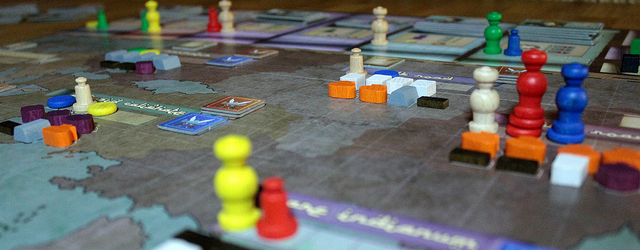











“and someone will spend 5 minutes balancing a Merchant on top of a Pasha…”
…
I didn’t need that long. 2 minutes, tops.
Hehehe =)